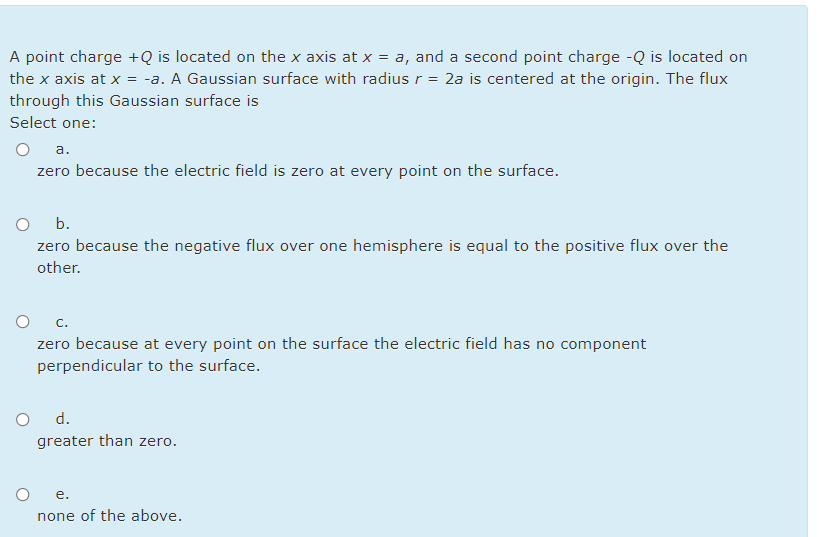A point charge +Q is located on the x axis at x = a, and a second point charge -Q is located on the x axis at x = -a. A Gaussian surface with radius r = 2a is centered at the origin. The flux through this Gaussian surface is Select one: O a. zero because the electric field is zero at every point on the surface. O b. zero because the negative flux over one hemisphere is equal to the positive flux over the other. с. zero because at every point on the surface the electric field has no component perpendicular to the surface. d. greater than zero. O e. none of the above.
A point charge +Q is located on the x axis at x = a, and a second point charge -Q is located on the x axis at x = -a. A Gaussian surface with radius r = 2a is centered at the origin. The flux through this Gaussian surface is Select one: O a. zero because the electric field is zero at every point on the surface. O b. zero because the negative flux over one hemisphere is equal to the positive flux over the other. с. zero because at every point on the surface the electric field has no component perpendicular to the surface. d. greater than zero. O e. none of the above.
Physics for Scientists and Engineers, Technology Update (No access codes included)
9th Edition
ISBN:9781305116399
Author:Raymond A. Serway, John W. Jewett
Publisher:Raymond A. Serway, John W. Jewett
Chapter24: Gauss’s Law
Section: Chapter Questions
Problem 24.63CP: A dosed surface with dimensions a = b= 0.400 111 and c = 0.600 in is located as shown in Figure...
Related questions
Question

Transcribed Image Text:A point charge +Q is located on the x axis at x = a, and a second point charge -Q is located on
the x axis at x = -a. A Gaussian surface with radius r = 2a is centered at the origin. The flux
through this Gaussian surface is
Select one:
а.
zero because the electric field is zero at every point on the surface.
b.
zero because the negative flux over one hemisphere is equal to the positive flux over the
other.
С.
zero because at every point on the surface the electric field has no component
perpendicular to the surface.
d.
greater than zero.
е.
none of the above.
Expert Solution
This question has been solved!
Explore an expertly crafted, step-by-step solution for a thorough understanding of key concepts.
This is a popular solution!
Trending now
This is a popular solution!
Step by step
Solved in 2 steps with 2 images

Knowledge Booster
Learn more about
Need a deep-dive on the concept behind this application? Look no further. Learn more about this topic, physics and related others by exploring similar questions and additional content below.Recommended textbooks for you

Physics for Scientists and Engineers, Technology …
Physics
ISBN:
9781305116399
Author:
Raymond A. Serway, John W. Jewett
Publisher:
Cengage Learning

Principles of Physics: A Calculus-Based Text
Physics
ISBN:
9781133104261
Author:
Raymond A. Serway, John W. Jewett
Publisher:
Cengage Learning

College Physics
Physics
ISBN:
9781305952300
Author:
Raymond A. Serway, Chris Vuille
Publisher:
Cengage Learning

Physics for Scientists and Engineers, Technology …
Physics
ISBN:
9781305116399
Author:
Raymond A. Serway, John W. Jewett
Publisher:
Cengage Learning

Principles of Physics: A Calculus-Based Text
Physics
ISBN:
9781133104261
Author:
Raymond A. Serway, John W. Jewett
Publisher:
Cengage Learning

College Physics
Physics
ISBN:
9781305952300
Author:
Raymond A. Serway, Chris Vuille
Publisher:
Cengage Learning

College Physics
Physics
ISBN:
9781285737027
Author:
Raymond A. Serway, Chris Vuille
Publisher:
Cengage Learning

Physics for Scientists and Engineers
Physics
ISBN:
9781337553278
Author:
Raymond A. Serway, John W. Jewett
Publisher:
Cengage Learning

Physics for Scientists and Engineers with Modern …
Physics
ISBN:
9781337553292
Author:
Raymond A. Serway, John W. Jewett
Publisher:
Cengage Learning